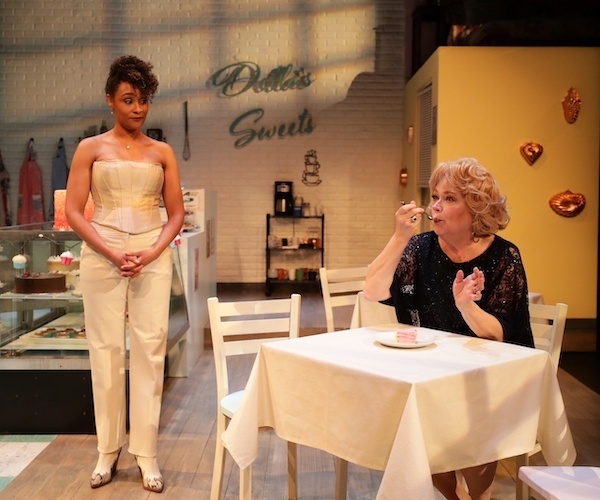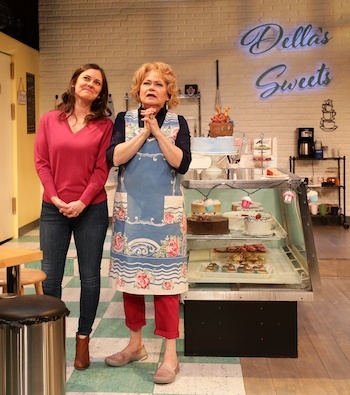Theater Review: “The Cake” — Thoughtfully Baked
By Nate Beyer
Dramatist Bekah Brunstetter sidesteps easy answers and pat revelations to produce a nuanced comedy about people coming to terms with who they are and where they are from.
The Cake by Bekah Brunstetter. Directed by Courtney O’Connor. Staged by the Lyric Stage Company at 140 Clarendon Street, Copley Square, Boston, MA, through February 9.

Kris Sidberry and Karen MacDonald in the Lyric Stage production of The Cake. Photo: Mark S. Howard.
The Cake could go wrong in thousands of ways. A script on a topical subject, a baker’s refusal to create a wedding cake for a lesbian wedding, could take the easy way out: spit out ready-made characters who take predictable stances in service of table-pounding self-righteousness. Thankfully, this play is not that. Instead, dramatist Bekah Brunstetter sidesteps easy answers and pat revelations to produce a nuanced comedy about people coming to terms with who they are and where they are from.
The titular cake in question is one for Jen (Chelsea Diehl) and Macy (Kris Sidberry). The baker, Della (Karen MacDonald), is an old family friend of Jen’s, but more than that, she is a kind of surrogate mom to the young woman, whose mother has died in the years before the play opens. Jen’s mother left her money for a wedding; the young woman’s dream of a ceremony in her native North Carolina has brought the couple back to the rural South.
In the play’s opening scene, Macy enters Della’s bakery and strikes up a conversation with the older woman. The two characters come from opposite worlds. Della is a Southern traditionalist, extolling the virtues of butter and eggs. The African American Macy embodies modern-day Brooklyn — where sugar is an addictive poison exploited by the food industry. She also works as a journalist at Slate and Jezebel and for other online forums that Della hasn’t heard of (though Jezebel rings a bell). Gluten-free by choice, Macy resists Della’s offer of a slice of lemonade-inspired cake. Jen enters the bakery and the couple’s relationship becomes clear to Della. The revelation is both personal — Jen is like family to childless Della — and cultural, an affront to Della’s religious beliefs.
Initially, Della refuses to make the couple’s cake. But, to the play’s credit, the hot-button decision to bake or not to bake takes on a complex resonance in the lives of Della and Jen. Della has been chosen to be a contestant on “The Big American Bake Off,” the American version of The Great British Baking Show. Throughout the play, Della chats with the disembodied voice of George — a stand-in for British Baking’s celebrity chef Paul Hollywood. Brunstetter uses these encounters to probe Della’s life. Her marriage has become sexless, so Della fantasizes about George, and the voice plays along, slipping into seduction mode and asking to taste her. At another point, as Della wrestles with her religious views, her parental love for Jen, and her own sexuality, George arrives to supply some Old Testament wisdom, admonishing her, “Thou shall bake.” Could it be that the tradition of butter, eggs, and cream — of always following directions — has become a trap?
Brunstetter understands that the more interesting part of dramatizing moral decisions is not the outcome but the struggle to arrive at a verdict. Jen, who came out in Brooklyn, not North Carolina, must grapple with a place that is foundational for her but may not accept who she is. The scenes between Jen and Della are the most affecting, Jen’s description of her adolescent view of hetero sex is mechanistic, almost frightening. She movingly remembers crying after sex with her college boyfriend.

Chelsea Diehl and Karen MacDonald in the Lyric Stage’s production of The Cake. Photo: Mark S. Howard
These revelations force Della to question her own marriage, to question the tensions between religious ideals and real life. Her sexuality comes under comedic focus; she recalls a crush she had on a female college roommate. Della also makes a daring attempt to revive the fire in her marriage. Her internal turmoil leads to the play’s most important (and most ambiguous) moment: she tells Jen that her marriage to a woman would have broken her mother’s heart. The charge seems almost cruel, a punch in the gut, particularly because Della is speculating about what a dead woman would feel. Even if it is true, the dead can’t change their minds.
But that moment pushes Jen to own the ground that she stands on as an adult lesbian in love. And the confrontation pushes Della to confront her own bigotry. They both come to see how shame, handed down through family and religion, has shaped the lives they have led. And this uncomfortable realization complicates their relationship with their partners, Della’s husband Tim (Fred Sullivan Jr.) and Macy.
Longtime Boston actor Karen MacDonald brings out the tough resilience in Della’s embrace of Southern decorum. Her performance hones in on the character’s contradiction: her desire for truth and her fear of living with it. She is also funny as hell, particularly in one scene that features a dab of well-placed buttercream. Chelsea Diehl manages to evoke Jen’s crisis without histrionics or hyperbole. We feel the figure’s uncertainty, even when she makes the play’s most unambiguous moral decision. As the flinty and erudite Macy, Kris Sidberry lends an air of vulnerability to her role as truth-teller. Ultimately, we see her love for Jen, and we also respect her commitment to the truth, no matter how painful it may be. (We all could use a Macy in our lives.) Fred Sullivan Jr. is fine as Della’s well meaning but limited husband, a guy who is willing to risk his own pride to satisfy his wife. The point is made via a particularly hilarious scene (you’ll never think of instant mashed potatoes in the same way again).
While The Cake is very funny, not all of its humor works. Racism, via Macy’s experience, is brought up, but never fully addressed. The revelation of Della’s dismissal from the baking show — because of her refusal to make the wedding cake — comes off as heavy-handed plotting that has little to do with the play’s emotional center. But perhaps that’s Brunstetter’s point. In real life, those caught up in these culture war dust-ups are not the ideologues that those on opposing sides would have them to be. Like Jen and Della, they are simply people trying their best to figure out where they are at home in a social landscape that they no longer recognize. The Cake, through its warmth and gentle humor, suggests that all sides need to embrace a vulnerability that leads to mutual understanding. It is time to build more bridges and fewer walls.
Nate Beyer is a writer and educator, and winner of the St Botolph Foundation Emerging Artist Award. His work has appeared in Dark Sky Magazine, the Arts Fuse, the Adirondack Review, and in print in Attache, the in flight magazine of US Airways. Contact him at nateb123@gmail.com.

Delighted to read that this production is as engaging as Barrington Stage’s two summers ago in Pittsfield (https://artsfuse.org/171623/theater-review-the-cake-not-a-sugary-culture-clash/), which I thought was excellent.